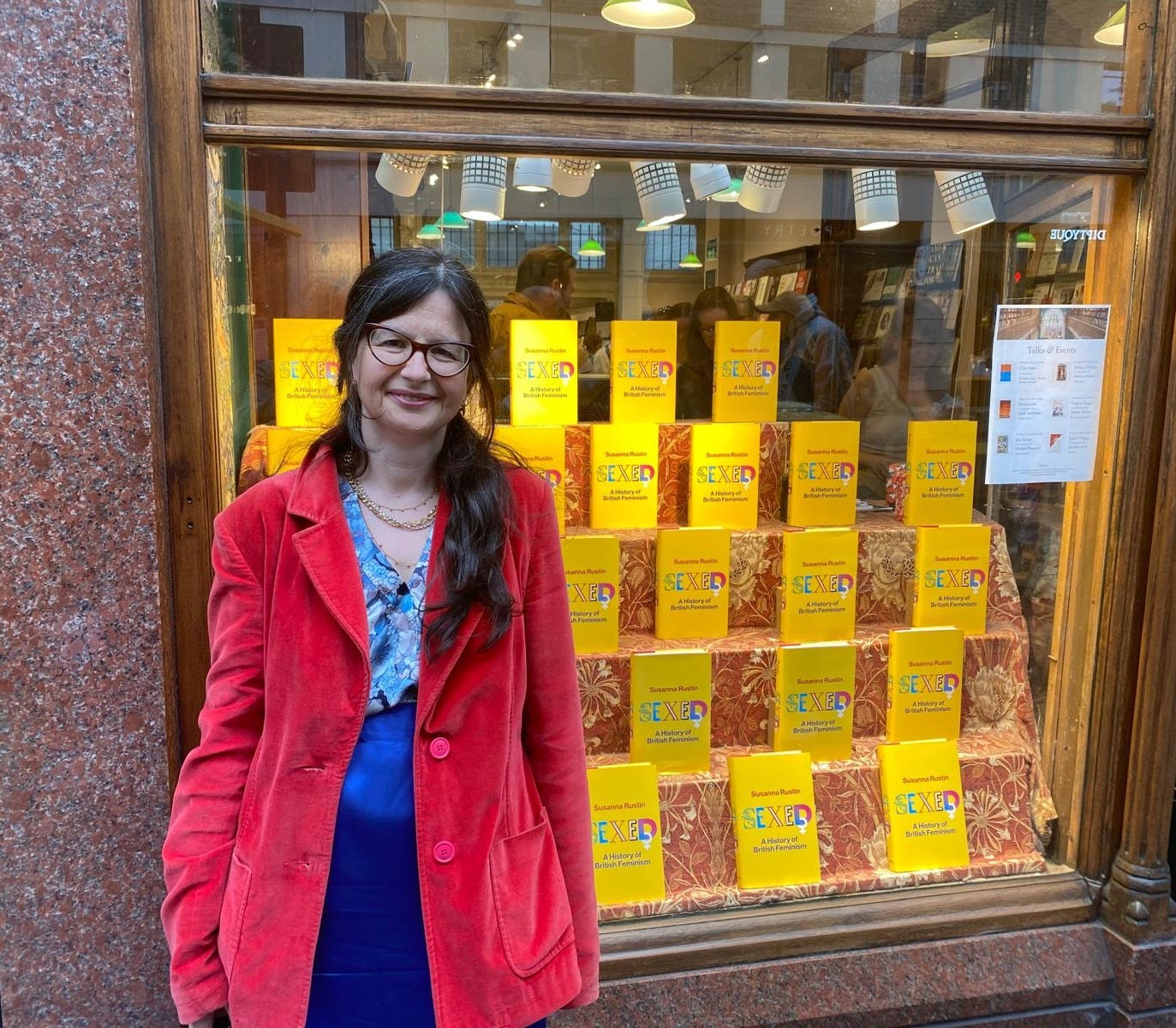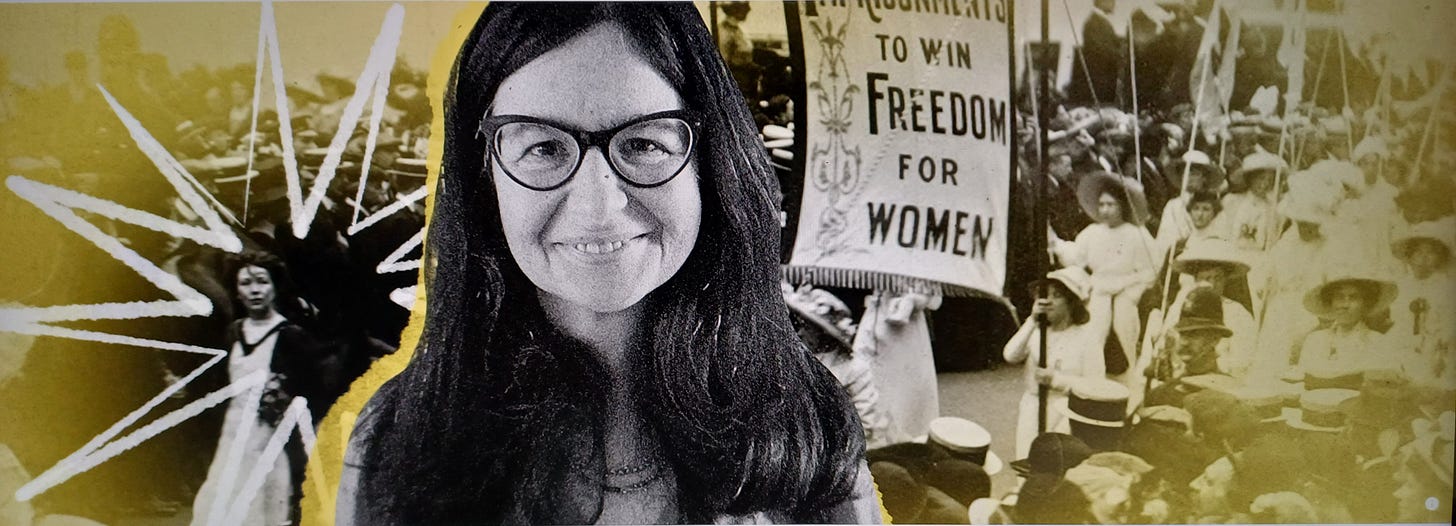The pride and shame of being a gender-critical author
My book about the women's movement, Sexed, is one year old – and I have been cancelled in Poland
It’s a year ago this week since my first book came out. Sexed: A History of British Feminism is a chronological, episodic account of the women’s movement in the UK, starting with Mary Wollstonecraft and ending with the gender-critical campaign of the past decade. A key theme of the book is the way that feminists have thought about the significance of biological sex versus social roles and conventions, as they challenged women’s oppression.
I was very lucky to get plenty of reviews and even appreciated one that chastised me for a lack of “contrition”, since what I like least about the gender wars is #nodebate. I had a party at Daunt Books in Marylebone, with a fabulous window display. FiLiA, the feminist charity, hosted a launch for me in London, with Samira Ahmed chairing an incredible panel.
I was invited to speak at three festivals – Stoke Newington and Queen’s Park in London, Todmorden in Yorkshire – and at various feminist events. This was all as brilliant as it sounds. I loved answering audience questions and signing books.

But grateful as I am for all this flattering attention, and privileged to have a job that enables me to write about women’s rights in the Guardian, the rest of this post is about the more challenging parts of becoming a gender-critical author.
I haven’t written about these before, partly because I do not wish to be portrayed as an entitled narcissist. I am well aware that I have had a far easier time than many other gender-critical women, and received more publicity for my book than many other authors. I worked on newspaper books pages for 10 years so have heard plenty of stories about circuitous, bruising routes to publication, and know how fortunate I was to find a committed agent (Caroline Hardman) and editor (Elise Heslinga). But while most first-time authors get rejections, most don’t get told, as I was, about an acquisition meeting at which staff became distraught at the prospect of working with them.
Other gender-critical authors have also faced resistance. Hannah Barnes, the journalist who wrote a book about the Tavistock’s gender identity service, Time To Think, had her proposal refused or ignored by 22 publishers before Swift Press took it on. Holly Lawford Smith, an Australian philosopher, faced an open letter challenging Oxford University Press’s decision to publish her book Gender-Critical Feminism. One signatory claimed it “devalues real scholarship”.
Nor are editors immune. Ursula Doyle of Hachette UK snapped up Kathleen Stock’s Material Girls, when Stock was a professor at Sussex university and one of the most cogent critics of self-ID proposals. But Doyle was singled out for for abuse by industry colleagues. She left her job, and recently reached a settlement with her former employer a few months before her belief discrimination case was due to come to court. SEEN in Publishing, the network for publishing professionals who recognise the material reality of sex, is about to launch a report featuring many more such examples.
I ended up being published by the independent Polity Press in its 40th-anniversary year. In many ways this was an ideal outcome. Polity is a mostly academic press that publishes books at trade prices. Because it uses peer reviewers, I got a big batch of expert feedback. This was hugely helpful to me, as a journalist writing a history book, and led to a much improved manuscript. Along with other non-academic authors including Jenny Lindsay and Karen Ingala Smith, I am lucky Polity is making a speciality of gender-critical and radical feminism – filling the space left by others – while also publishing books by gender-identity advocates in line with its pluralist values.
But Polity doesn’t have the marketing budget of the big, trade publishers. Nor does it produce audiobook, or mass-market paperback versions of its titles. So while other authors of books published last year are busy promoting new editions, at lower prices, with freshly designed covers, I can only hope that people will continue to buy or borrow mine in its original hard cover and yellow jacket.

Festival invitations were a bigger deal than they sound. Helen Joyce had to wait four years from the publication of her book tracing the history of gender identity activism, Trans, for her first festival appearance. Jenny Lindsay has just written an excellent article about how painful it was not to be invited to this year’s Edinburgh International Book Festival with her book Hounded.
Shockingly, she has not been asked to any other book festivals either. Nor have Susan Dalgety and Lucy Hunter Blackburn, co-editors of the best-selling anthology The Women Who Wouldn’t Wheesht. Polly Clark, who believes she is “the only known gender-critical author” on Edinburgh’s 2025 programme, wrote this blistering piece about the dissonance of a festival claiming to be focused on the theme of “Repair”, yet pointedly excluding women who insist on the importance of biological sex.
But there is another reason why I have kept quiet about my own rebuffs and disappointments. And that is the shame attached to these moments. In Hounded, which anatomises the harms caused by gender-identity activism, Jenny distinguishes between private and public consequences. But while her personal experience of being hounded out of her career as a poet and arts programmer is her book’s starting-point, she admits to being “wary of confessing: the hurt, the upset”.
I have not paid anything like as high a price for my opinions. But like her, I have been wary of revealing when I have been humiliated. Apart from publishers’ rejections (which could be viewed as par for the course, tearful protests aside), these experiences have included my anxious embarrassment about repeated complaints to the organiser of a webinar I spoke at, and objections at two venues where I was due to appear. I was mortified when Conway Hall in London refused a booking for an event I would have been part of, and crestfallen to learn of a bookshop where staff were told by a manager not to display my book in the feminism section. At another shop, which I knew had signed copies hidden away, I was too shamed by the snub to ask why.
But my most dramatic experience came earlier this month, when I was cancelled in Poland. I know liberals roll their eyes at this expression, but it seems apt for what happened when an interview I did for the news website OKO was published, then removed a day later. While OKO offered no explanation on its official channels, a social media post from one of its journalists read: “On behalf of the entire editorial team, I sincerely apologise for running the interview with the terf S. Rustin. Vigilance failed.”
More than two weeks later, an email I sent to the editors querying this course of action, and objecting to the public insult, has received no reply though I am in touch with the interviewer, Krzysztof Katkowski. He had no part in the decision to remove the piece, which was all the more disappointing as he repeatedly challenged my emphasis on biology and the headline (in Polish) was “Biology that divides? Feminists, empire and the question of a shared future”. In 2020, ironically, OKO won a journalism award from Index on Censorship.
Krzysztof has given permission for me to publish the piece in English, which I hope to do soon, and for which I am grateful. Asked by me what he thought lay behind OKO’s decision, he pointed to the lasting impact in Poland of eight years of far-right (Law and Justice party) government, “especially on public discourse around LGBTQ+ issues”, and said this volatile political atmosphere could have led to heightened editorial caution. Earlier this month, Law and Justice dealt a blow to Donald Tusk’s reform agenda when Karol Nawrocki won the presidential election on a platform including opposition to civil partnerships for gay and lesbian couples.

Logically, I don’t think I should be ashamed about any of this. What matters much more than my feelings is that, in Poland, gender-critical feminist views remain verboten, which I believe harms democracy and helps hard-right populists. But as Jenny Lindsay describes in Hounded, the personal and political cannot be easily separated because delegitimising feminist objections to trans activist goals involves discrediting and ostracising us.
In his new book, A Philosophy of Shame, Frédéric Gros describes the kind of social dishonour that follows from such treatment as “a kind of viscous negativity that sticks”. It strikes me now that one reason why I have opted for a brave face, in preference to owning up to such feelings, is a fear of this contagion, which I think also menaces observers who feel themselves complicit with silencing tactics.
Gros describes various ways of coping with shame, or transmuting it into something else. For me, a feeling of solidarity with other gender-critical authors has been vital, as I have struggled with the discomfort produced by the disapproval of others. One year on, and after being de-published in Poland, I am more determined than ever to stand with my sisters. I am especially keen to do this at book festivals, if any open-minded programmers should happen to read this.
Sexed: A History of British Feminism is published by Polity Press and is free to borrow at public libraries.
ReplyForward
Add reaction







Thank you for writing this piece, Susanna. I'm so sorry this has happened to you in Poland, but what better to do with such a negative experience than turn it into a Substack shining a light on what GC authors, especially female ones, know has been happening in the shadows for years now. I stayed silent for years on many negative experiences as a GC poet, as I was so concerned that by publicising them I was making myself vulnerable to more and more vicious attacks. I feared it would be like putting blood in the water, showing I was wounded, when sharks were already circling. But breaking that silence was the best thing I could have done. And more and more of us are doing it now. Proud to be counted as one of them and to stand alongside you.
Astonishing really, because ordinary people in Poland are very very much not woke. But again, it's these little cliques in the white-collar world of arts and humanities, publishing, academia and the media that have a totally different set of norms, which they desperately ape from America to try and be cool. They don't even care about trans or LGBTQ people in any meaningful or practical way, it's just a question of following the latest trends. An etiquette and status game for the upper-middle classes.